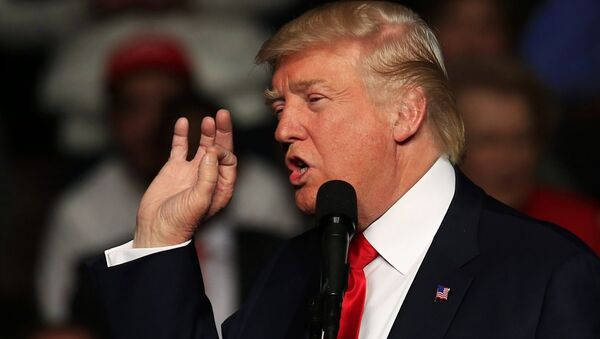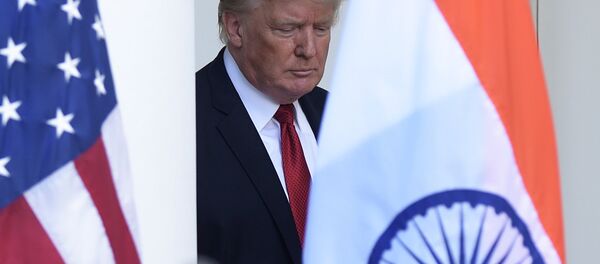New Delhi (Sputnik): As US President Donald Trump moves ahead with his plan to bring an end to the Generalised System of Preferences (GSP) for India in early May, a trade war could be on the cards. As it would effectively hit $5.6 billion worth of Indian exports covering 5,111 tariff lines, officials in New Delhi are reportedly considering retaliatory tariffs on US exports to India.
However, economists on either sides opine that a possible "trade war" between Washington and New Delhi would lead to a no-win situation for both countries.
Trump has long been a vocal critic of New Delhi's trade policies, calling them the "tariff kings" for not complying with his efforts to open up the Indian market for American companies."I am taking this step because, after intensive engagement between the United States and the Government of India, I have determined that India has not assured the United States that it will provide equitable and reasonable access to the markets of India," Trump said.
Since 1976 India has been a beneficiary of the GSP, a system which sets zero tariffs on certain goods for a set of 120 developing countries with the aim of fostering trade and economic development between the US and developing nations.
READ MORE: India Downplays Trump's Intent to Withdraw Trade Benefits
The Indian Commerce Ministry tried to play the matter down with the Commerce Secretary Anup Wadhawan saying "The withdrawal of GSP benefits to India will have a minimal and moderate impact," and stated that even if the tariffs are imposed, they would be as low as 4%.
However, one needs to keep in mind that a lot of Indian exports are labour intensive and have very thin profit margins. Thus, even small duties can result in huge losses and potential render some businesses unprofitable, particularly if their main market is the US.
"Many of the goods that we produce here in India and export to the US primarily consist of engineering goods which are used by them as raw materials. Therefore if they increase the tariffs, their own products will become costlier as well. In this matter of a tariff war, only India cannot be blamed, the US too should have kept in their mind that India has always played a good friend to them and the relationship that goes beyond trading between the two countries could be impacted as well if a trade war is initiated between the two countries," Aksah Jindal told Sputnik.
READ MORE: India Considers Opposing US Decision to End Duty-Free Status via WTO — Source
The concern for domestic goods becoming more expensive under a tariff regime has also been echoed in the US. Earlier, in a letter addressed to US Trade Representative (USTR) Robert Lighthizer, from Senators John Cornyn of the Republican Party and Mark Warner of the Democratic Party, they wrote "While we agree that there are a number of market access issues that can and should be addressed, we do remain concerned that the withdrawal of duty concessions will make Indian exports of eligible products to the United States costlier."
While New Delhi has been mulling imposing retaliatory tariff on the US for quite some time now, the Indian government has time and again extended the deadline, and it is unclear if they will eventually make a move and risk further tariffs or even sanctions.
The views expressed in this article are those of the speakers and do not necessarily reflect those of Sputnik.



